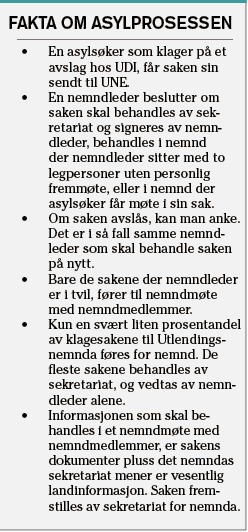(THIS ARTICLE IS MACHINE TRANSLATED by Google from Norwegian)
Ny Tid wrote in the previous issue about two Chechen men who were not granted asylum in Norway, and who were found dead after they returned to Chechnya. Erling Krogh usually works as an associate professor at the Norwegian University of Life Sciences in Ås. He has twice participated in the court-like system in the Immigration Appeals Board (UNE) – in two other cases involving asylum seekers from the North Caucasus. "The reason why I am interviewed now is because the Norwegian system as it works today has given me great anguish. I experience that the legal security of asylum seekers is not satisfactory at all in Norway. I am embarrassed to be Norwegian, "says Krogh.
Critical to the facts. Krogh says that the information he and the other lay members of the appeals committee received and were to base the decision on was lacking. "We did not receive information about several significant factors that could make it dangerous for asylum seekers to return to Russia or the North Caucasus. This is information that Landinfo, the UDI's own body, had investigated and established, "says Krogh. Landinfo is a Norwegian government organization that collects information about the conditions in countries where asylum seekers come from. Krogh is critical of the fact that he did not receive information about the danger of so-called derived persecution in Chechnya. Derived persecution means that if a person is wanted by the authorities, they also persecute the family members. "We were not allowed to put in context that kinship to persons wanted by those in power in Chechnya or Ingushetia is dangerous. We were not informed of the danger of being in close relatives or in the same clan with people that the authorities want to get hold of. That is, if a person has done an action the authorities do not like, it also means danger to the person's family members, "says Krogh .
Chechen dictator Ramzan Kadyrov has repeatedly stated directly on state television that relatives "must be held accountable" and that he should find them wherever they are. Chechnya is ranked by the Freedomhouse organization as one of the world's most dangerous countries for opposition.
«UNE's duty to disclose this.» Krogh tells Ny Tid that he received the information about, among other things, derived persecution by lawyer Jostein Løken, who was in as a defender for one of the asylum seekers from the Caucasus. "This information did not emerge from the case preparation for UNE, and thus not in case documents we had received in the tribunal. Lawyer Løken presented five reports from Landinfo. When these five were put together and read in context, it was obvious that the asylum seekers in both cases I had been involved in had such a great need for protection that they could not be sent back – neither to Russia as internally displaced persons nor to Chechnya or Ingushetia. "
What do you think about not getting this information?
"In the one case I was in, there were two against one. That is, I and the other lay person in the board voted for the asylum seekers to stay, while the board chair voted against. This meant that asylum seekers were not sent back and that is far from satisfactory. But investigating and then producing case matters that are decisive for the decisions that the board will make is not a job I or the lawyer should do. I believe UNE itself is absolutely committed to doing these investigations, "Krogh says, adding:
“It is neither my job nor my role as a board member, nor the lawyer's job. In that case, asylum seekers would be totally at the mercy of the lawyer he or she is assigned. This is unsustainable when you as a member of the board can experience lawyers who barely open their mouths during board meetings. ”
Could send asylum seekers to death. You got this information from the lawyer. What if you had another lawyer who had not provided these documents?
"It is possible that we had reached a different conclusion based on the information we had. According to last month's report in Ny Tid, the people could have been sent to Russia, then to have been sought in Russia and deported to Chechnya, where there is a great danger that they would be subjected to gross torture and liquidated, »Says Krogh and adds:
"The lack of information about the danger of internal escape and the omission of cultural conditions in Chechnya, where a cousin of a wanted person can be equated with the wanted person, is, in my opinion, breaking his legs under the legal security of the person concerned. If key conditions for the person's legal security are not thoroughly investigated in advance in advance, people who should receive protection are sent back to a very unsafe fate, at worst death, "says the researcher and the member of the committee.
“My concern is that UNE should make the most correct decision possible. As a member of the committee, I adhere to the Norwegian rules of law, and I am concerned that the committee will make objective assessments of facts and go through all relevant matters as a basis for making fair decisions – both in terms of credibility and protection needs. I would like to sit in the Immigration Board again, ”says Erling Krogh.

Got a thank you letter. Jostein Løken works in the law firm Elden, and has had many cases from Chechnya and the Caucasus. He says he received an anonymous letter after submitting information in a complaint. "I once received an anonymous letter from a committee member thanking me for providing information that was important to the case, beyond what the board members had been informed by UNE," Løken says. “I have not felt confident that the boards are getting enough information, so I have included and put forward what I believe is relevant and of interest. I've provided Landinfo reports and reports from other sources, ”he says.
"I'm embarrassed to be Norwegian."
Has meetings without a lawyer and asylum seeker. The vast majority of asylum cases are not dealt with by a "jury" or in a committee meeting. Attorney Jostein Løken is critical of this:
“When I am summoned to a board meeting, I usually win the cases and get well. The problem is that there are few cases where there will be a board meeting with two lay persons and one committee chair, ”says the lawyer, who has been successful in over ten cases in UNE.
How is the information you provide received?
“I think the board leaders have welcomed this with an open mind and that there has been a good atmosphere around this in the meetings. But I'm not sure the cases have been well enough and broadly informed in advance, ”says Løken. He is worried about the legal security of asylum seekers after UNE has started meetings without asylum seekers and a lawyer.
"I think this is unfortunate, especially if it is as the member of the Krogh board states: that the case has not been adequately disclosed," says the Elden lawyer.
The Immigration Board believes that Erling Krogh and the people he put in were given enough information to give the two asylum seekers protection.
The Immigration Appeals Board (UNE) and assistant director Ketil Larsen reply to Ny Tid by e-mail. Their main message is that they believe Krogh had sufficient information, that they work to ensure the quality of their processes and that they take Krogh's input further.
What does UNE say to the criticism from the Krogh committee member that UNE should include information from Landinfo that family members of the wanted persons may also be subjected to persecution and torture in Chechnya?
“UNE works to ensure that each case is as well informed as possible, and that our committee leaders and committee members have access to quality-assured country information, including from Landinfo. This also means that the information we provide to the committee must be relevant to the questions and issues the individual case raises. ”
 Enough information. What does UNE say that Krogh thinks UNE should have included more information about Landinfo's view of internal flight in Russia, and possible dangers?
Enough information. What does UNE say that Krogh thinks UNE should have included more information about Landinfo's view of internal flight in Russia, and possible dangers?
“After each committee meeting, the committee members receive questions in an anonymous questback on various things at the meeting. Last year, 96,7 percent answered "yes" to the question of whether the land information submitted was relevant to the case. We receive consistently positive feedback from our board members on the conduct of the board meetings and the basis on which they decide the issues. ”
Krogh believes that this information from Landinfo should be provided by UNE to the board members when they should get involved. What does UNE say about it?
“As far as we can see, Erling Krogh participated as a board member in two Russia cases in 2013 – one Chechnya case and one Ingushetia case – where Onion was a lawyer in the last case. Both of these cases ended up giving the complainants protection, and the board thus had sufficient information in both cases to provide protection when the cases were decided »
What do you do with these recordings Krogh comes up with?
"We note that Krogh believes that land information provided by the lawyer should have been provided by UNE itself, and we include it as an input to our case management. Feedback from the board members is naturally part of UNE's work for good quality in the case processing. ”

